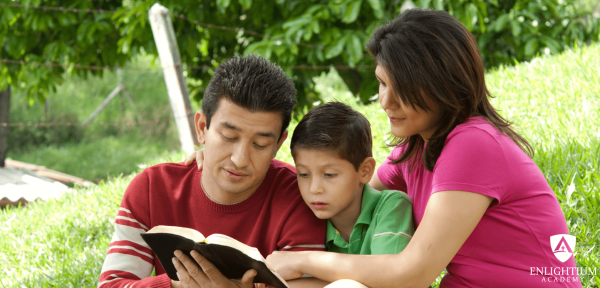If one wants to grow and mature in Christ, as well as adhering faithfully to one’s daily rule of prayer, it is necessary also to faithfully read the Bible. This is not the word of the Evangelical Dr. Billy Graham, but of the Orthodox St. John Chrysostom, who taught that ignorance of the Scriptures was a great abyss. In older days, not everyone could afford books or copies of all the Scriptures. Nowadays anyone can own a Bible who wants one. There is now therefore no excuse for being ignorant of what the Bible teaches. Admittedly some parts are more difficult to understand than others (which is why we have clergy to help us), but the basic stories and message are easily absorbed.
There are many systems for reading. Some suggest a chapter a day starting from Genesis; others prefer to use the church lectionary (although this latter leaves untouched most of the Old Testament—i.e. most of the Bible). Here I would like to talk about the spirit in which to approach our Bible reading, leaving the topic of systems of reading and how to understand what we are reading for another time.
The temptation is to treat Bible reading like a duty which we must perform, a duty rather like mowing the lawn or flossing our teeth. Sometimes people feel guilty if they do not regularly read the Bible and bring their omission to confession as if it were a sin. In their heads there is a large invisible sign saying, “THOU SHALT READ THY BIBLE”, and if they don’t read their Bible they feel they have not done their duty. They imagine that God is keeping score, and that they will be reamed out for their negligence on Judgment Day.
Regarding Bible Reading as a duty does not provide not much incentive to read it. We tend to avoid work like this if we can: we only mow the lawn because it will quickly become a jungle if we don’t and the neighbours will complain. We only floss our teeth because if we don’t floss, things will be more unpleasant for us the next time we sit in the dentist’s chair. But let’s be honest: most of us would avoid such duties if we could.
I therefore suggest that one should read the Bible as if doing something faintly illegal. One should first metaphorically lock the door, draw the blinds, and then pull out the Forbidden Book from the locked drawer and read it in secret. That is because the Bible is a dangerous book: it tells of the doom of the world, of the day when this earth will perish in noise and flame and when a new earth will arise from its ashes, a world where sin no longer has a place and where righteousness finally finds a home. It strips the masks off all liars and politicians, and it drowns their lies in a flood of unwelcome truth. In it we read of the true dignity of believers, of their future triumph and glory, and of how the meek will inherit the earth. It reveals the truth as something shining, scandalous, untamed and untameable—and therefore dangerous. After we have read our fill, we put the Forbidden Book back into its secret drawer, and open the curtains, and unlock the door. We will have been filled with forbidden, shiny, and dangerous truth, which will make us a bit shiny and dangerous too. And no one looking at us after we have read from the Book will be any the wiser.
Reading this Book will begin to make us free—free from the contamination of propaganda and lies which flow about us nonstop every single day. The Master said so: “You will know the truth, and the truth will make you free” (John 8:32). Indeed: it will make us free—but first it will probably get us into a lot of trouble.
That is because this age does not like people who are really free. It prefers people who have been tamed, rendered passive, pliable, suggestible. People who believe everything they are told and are therefore safe. People who are slaves. But Christ sets us free from the values and lies of this age and from being the slaves of men, and only those who follow Him are truly free.
We see this clearly in the martyrs: as they entered the arena of death they sang for joy, for they were the freest of all men. That is because they could not really be killed—they had already died and their life was hidden with Christ in God (Colossians 3:3). Those screaming at them from the stands were in chains. The martyrs alone were free.
That is why we should read the Bible—not because it is one of our duties, but because it is the only way to grow in freedom. Reading the Bible—along with saying our daily prayer rule—is a subversive act. We do it because baptism has made us a part of God’s resistance movement, His one, holy, catholic, and apostolic Church, which quietly rebels against the god of this age. Reading the Bible fills us with truth, giving us a kind of growing immunity to the world’s lies. Satan knows this, which is why our first persecutors were keen to confiscate copies of the Church’s Scriptures. Let us continue as part of God’s resistance movement, praying, “Thy Kingdom come”. And let us continue to read from His dangerous Book.

















